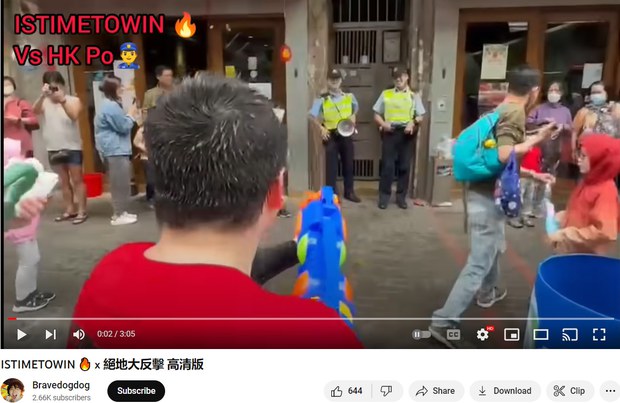Hong Kong police arrest two men for shooting water at police during festival
Share

One of the two men sprays water at police officers during the Songkran festival in Hong Kong.
Police in Hong Kong have arrested two men for firing water guns at police officers and TV crew from a pro-Beijing news organization at a popular street festival in Kowloon.
Officers with the serious crime squad are now investigating the case following the arrests of two men, aged 25 and 26, police told journalists.
“The two arrested men and four other men kept using water guns and bottles to shoot water at police officers and media workers … at very close range, in an attempt to disrupt social order,” chief inspector Cheung Lok-chuen told reporters on Thursday. “The whole incident lasted for three minutes.”
“Later, they added inflammatory speech into a video and posted it to an online platform,” Cheung said. “We do not rule out that this was a premeditated action, and more arrests could follow.”
Cheung was referring to a video posted by YouTuber @Bravedogdog, who shared a video titled “The Jedi Strikes Back” from the incident at the Songkran Festival in Kowloon, which takes its inspiration from the Thai water splashing festival.
In the video, a group of men approach the police officers and reporters from the pro-China Television Broadcasts (TVB) station, shouting, cursing and shooting water at them at close range, while the theme song from a Hong Kong movie “Young and Dangerous” plays under the footage.
The arrests came after pro-China columnist Chris Wat hit out at the men for “pretending to splash water, but really looking for trouble” and pointing to fears of a resurgence of the 2019 protest movement.
A similar report appeared in the Chinese Communist Party-backed Wenhui Takung news site.
Taking a harder line
Current affairs commentator Sang Pu, who is a lawyer by training, said even firing a water gun can be regarded as a matter of “national security” amid an ongoing crackdown on public dissent under a draconian national security law imposed on the city by the ruling Chinese Communist Party from July 2020, criminalizing public dissent and peaceful political opposition.
“Hong Kong isn’t what it used to be,” Sang said. “They might have thought they were safe, but others might think they had the intention of attacking [the police].”
“As long as those in power and those enforcing the law believe that you did have such an intention, they can charge you with a crime,” he said.
The incident wasn’t the first time police have had water or powder thrown at them during the festival, but now appear to be taking a harder line, according to retired police superintendent Lai Ka Chi.
“While the police were expecting to get wet, they were surrounded and drenched, which must have made them think they should do something,” Lai said. “It usually depends very much on the attitudes of both the police and the civilians at such events [whether action is taken].”
“It could be that some people in the crowd thought it was too much, and that was the triggering factor [for the arrests].”
The men were arrested on suspicion of “incitement to cause a breach of the peace,” leading to speculation that even water guns are now regarded as weapons under the national security law.
Changing attitudes towards police
“It’s inevitable that people will have their doubts about what the police motivations were, or their attitude, given that the general public’s attitude to the police has changed … since 2019,” Lai said in a reference to the police crackdown on the 2019 protest movement, which was widely criticized by the international community.
The mass, peaceful protests of 2019 grew into pitched street battles between protesters armed with bricks, Molotov cocktails, catapults and other makeshift weapons against riot police who fired tear gas, rubber bullets and occasionally live ammunition at protesters and journalists.
Rights groups and protesters alike criticized the unsafe and indiscriminate use of tear gas and other forms of police violence during the months-long protest movement, as well as rampant abuses of police power and abuse of detainees.
Police violence against young and unarmed protesters early in the movement brought millions onto the city’s streets and prompted the occupation of its international airport.
In other incidents, unarmed train passengers were attacked by both armed riot police at Prince Edward station and by white-clad mobsters at Yuen Long, who laid into passengers and protesters with rods and poles while police took 39 minutes to answer hundreds of distress calls from the scene.
Translated by Luisetta Mudie.







